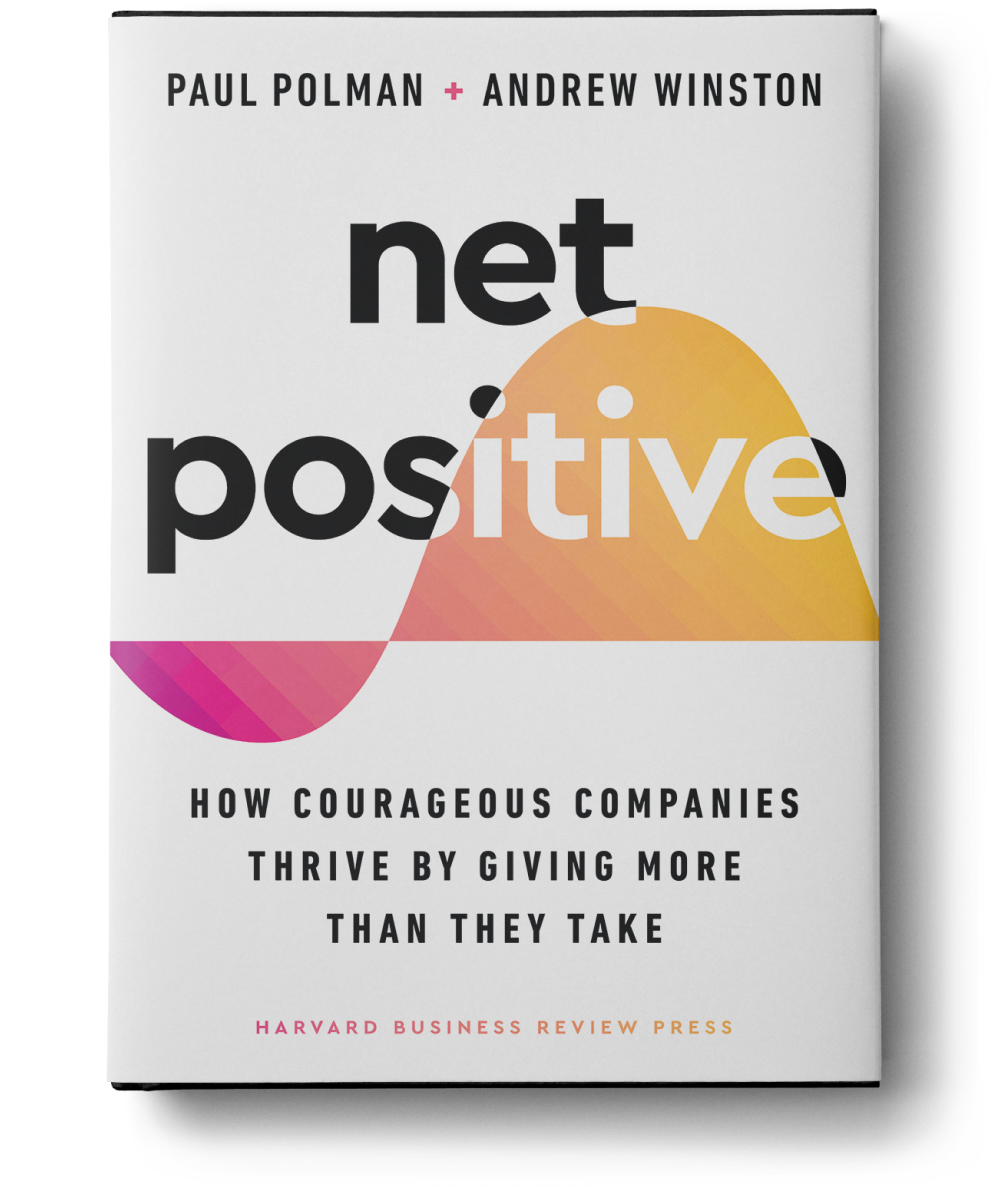All,
I’m writing from Glasgow, where we are halfway through COP26. It’s still too early to judge the outcomes of the Summit, but tremendous efforts are being made to keep 1.5 alive (meaning the target to hold global temperature rises beneath 1.5 degrees). A number of big announcements have been made, including on deforestation, coal, methane and finance. We all know we need to do more, and faster, including creating robust mechanisms to hold ourselves to account. Bluntly, we don’t have a choice. There is still everything to play for as negotiators now hammer out the deals.
So more to follow on COP next week. For now, I want to share with you a second exclusive excerpt from my new book with Andrew Winston, Net Positive: How Courageous Companies Thrive by Giving More Than They Take. It’s from a chapter entitled “How much do you care?”
In many ways, this is now the biggest dividing line in business: between the corporate leaders who truly care, and those who don’t. It’s not about being a saint or a sinner, but about being the kind of leader who will help solve the world’s problems, even if your business is not perfect (whose is?). It’s no longer viable or profitable to sit on the sidelines and hope someone else will fix our economic, planetary and societal problems – CEOs need to step up. Those who do, and who embrace a renewed, Net Positive-style of leadership, will reap the rewards for their companies and our world.
Enjoy,
Paul
Countless books, classes, and business school cases have explored leadership. We’ve long tried to distill what makes someone worthy of being followed. And that applies to all people, not just CEOs. Many people sit atop some kind of pyramid in an organization, managing or influencing others to work toward a goal. People can lead and inspire from many places.
No matter the level, there are evergreen leadership skills that were important fifty years ago, and will be fifty years from now. Effective leaders share traits, such as discipline, toughness and holding people to high standards, strategic thinking, intelligence, curiosity, and a desire to understand key drivers of a business like technology. In today’s volatile, uncertain, complex, ambiguous world, other traits, in particular adaptability and resilience, become critical as well.
But leading a net positive business takes more than the basics. The best leaders, the ones people will want to follow into this new territory, are first and foremost good human beings. They are at ease with themselves, have integrity, and what they say and what they do are in sync. Net positive leadership is also about putting others’ interests ahead of your own. It helps to know your own strengths and passions as well. The sweet spot is leading in the overlap of what you’re good at, what you like, and what the world needs. Getting there might require developing new skills and leaving your comfort zone.
We see five critical traits that help create a net positive leader, which we’ll explore in more detail:
- A sense of purpose, duty, and service
- Empathy: a high level of compassion, humility, and humanity
- More courage
- The ability to inspire and show moral leadership
- Seeking transformative partnerships
The world needs leaders who are the opposite of the old “company man” who coldly maximizes profits, and who instead embrace being more vulnerable, open, caring, empathetic, and human. Organizations should strive for those traits as well. The obsession with shareholder value has turned businesses into soulless money machines. It’s all numbers, statistics, and profits. Companies have become robotic, valuing only contractual relationships instead of open, trusting partnerships (neither of us are big fans of contracts—we’re writing this book together on a handshake).
Businesses rejected the balance of ethics that Adam Smith talked about in favor of pure efficiency. As Oxford business professor Colin Mayer says in his book Prosperity, the humans in the equation have been replaced with “anonymous markets and shareholders over whom we have no control.” We’ve all done a good job of divorcing our personal selves from work life, but at a high cost. We believe that a business is and should be human, with real people serving the needs of other real people. If we start with people as the core of business—not with the pursuit of short-term profits—then the first step in building a more human business is to look inward to find the strength to change how business works.
A company can only head toward net positive if it has leaders courageous enough to challenge business as usual—leaders who understand that profit should come not from creating the world’s problems, but from solving them. How can we keep earning when the world is burning? The solutions to many of our challenges are available, and there’s plenty of capital to invest. What’s stopping us? Part of the answer is that resistance is high, from both inertia and vested interests. So, finally, leaders need determination to fight through the roadblocks. Willpower comes from cultivating net positive leadership principles, such as purpose, humility, and courage. Underlying those traits, basic human values can be our guide and foundation of a new kind of leadership: justice, compassion, dignity, and respect—it’s the Golden Rule again. When you know what the right thing to do is, you’ll find the courage to take a stand.
